The Daily 202: Third Way makes an opening bid in the 2020 ‘ideas primary’

| Third Way makes an opening bid in the 2020 ‘ideas primary’ |

Donald Trump waves as he walks off after participating in a roundtable discussion on tax policy at a Boeing facility in St. Louis on Wednesday. (Evan Vucci/Associated Press)
|
BY JAMES HOHMANN
with Breanne Deppisch and Joanie Greve
THE BIG IDEA: The center-left think tank Third Way believes President Trump’s unpopularity may be enough for Democrats to win control of the House in 2018, but it will not be sufficient to take back the White House in 2020.
The group, which has close ties to the party’s establishment, is proposing a new social contract for the digital age. A report being published todaylays out a dozen policies that Democratic presidential candidates could run on. These ideas flow from a year-and-a-half of soul searching after the 2016 election.
“We came to the realization that, along with everybody else in Democratic politics, we had gotten a lot of things wrong about how Americans were thinking and feeling,” said Matt Bennett, a co-founder of Third Way and an alumnus of Bill Clinton’s White House.
In their view, the digital revolution is as destabilizing as the industrial revolution. A third of the country benefits from the tailwinds of automation and the gig economy while the other two-thirds are sailing against head winds. More parents fear that their children will not be better off than them. Millennials will move between jobs more than twice as often as Generation Xers.
“This is really kind of the opening bid of the ideas primary for 2020,” said Jim Kessler, Third Way's senior vice president for policy. “Democrats need a positive, modern, forward-looking economic agenda that gives people hope that they're going to have the opportunity to earn a good life in the future.”
Kessler, who was once Senate Minority Leader Chuck Schumer’s legislative director, noted that while the Bernie Sanders wing of the Democratic Party is focused on income inequality, Third Way has decided to focus on the concentration of opportunities.
“In some parts of the country, opportunity falls from the trees,” said Kessler. “In other areas, it's like ‘The Hunger Games.’”
There’s not a geographic bias to where smart ideas come from, but there is a bias to where capital flows. They note that small business loans are harder now to get than before the financial crisis; rural lending is below 1996 levels, when adjusted for inflation; and three-quarters of venture capital funding goes to California, New York and Massachusetts.
The number of businesses in operation declined over the past decade in two-thirds of the nation’s counties. This dynamic has hit three of the blue states that flipped to Trump especially hard: 76 of Michigan’s 83 counties have fewer businesses than they did at the turn of this new century, as do 58 of 72 counties in Wisconsin and 42 of 67 counties in Pennsylvania.
Democrats have squandered their advantage over Republicans on the crucial question of which party people think can best create jobs. Since the economy tends to be the most paramount issue for voters, this poses a long-term electoral problem.
The most ambitious proposal in Third Way’s new report, shared first with The Daily 202, might be universal private pension accounts to supplement Social Security. Employers would be required to contribute 50 cents an hour for every employee.
They want to replace “unemployment insurance,” a vestige of the 1930s, with “reemployment insurance.” People could still collect bimonthly checks, but there would be grants to fund skills development in sectors that have openings. The unemployed would get vouchers to move to places where there are open jobs, and bonuses would be available to people who find new jobs quickly.
Also on the list: minimum wages that vary by region; eliminating all taxation on the first $15,000 of earned income; a public fund that backs small and medium business loans; broadband for all; a “Boomer Corps” to let seniors earn tax-free income by performing national service; more transparency to make college affordable; federal parental leave insurance, which would provide every family up to $600 per week for the first six weeks after a birth or adoption; and expanding the child tax credit to $5,000 for kids under five.
To pay for these initiatives, they’d close the carried interest loophole, get rid of the expanded estate tax deduction and cut discretionary spending elsewhere.
Liberals have been ascendant inside the party for many years, and that wing of the party has become even more dominant since Barack Obama left office. That’s why Third Way is playing the long game. They don’t expect any presidential candidates to embrace their ideas wholesale, although they’d be stoked if some did.
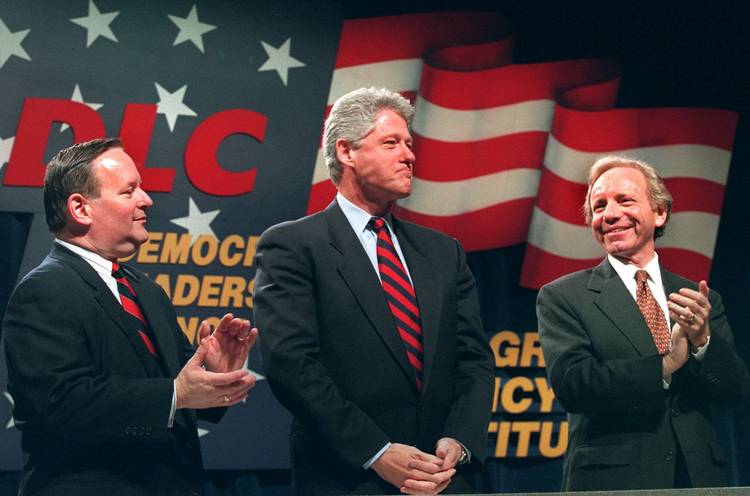
Bill Clinton speaks to the Democratic Leadership Council in 1995. (Wilfredo Lee/Associated Press)
Historically, paradigm-shifting ideas must percolate for a while before they’re embraced by campaigns. Politicians, after all, have very strong incentives to care more about the next election than the next generation. When liberal technocrat Michael Dukakis was still the party’s standard bearer, for example, the Democratic Leadership Council was promoting the ideas that would comprise Bill Clinton’s “New Covenant” in 1992.
The Heritage Foundation was pushing small-government conservatism during the early 1970s when Richard Nixon was creating the EPA and proposing liberal pipedreams like a guaranteed minimum income. Then Ronald Reagan won in 1980 on ideas that were perceived as out-there at the time but have now become orthodoxy.
Voters are desperate, and the electorate remains restive. The masses have turned on the elites. In five of the past six elections, one of the parties has lost either the White House or a chamber of Congress. It seems more likely than not right now that it will happen again in 2018.
Third Way fears that Democrats will try to counter the spread of “nativist, nationalist and nostalgic populism” on the right with a warmed-over version of left-wing populism. The leaders of the group insist that Democrats must reject anything that does not feel like a complete pivot from an industrial economy that’s gone and never coming back.
They say 1990s-style centrism, which they championed at the time, is now too tepid to tackle the challenges of the 2010s. School uniforms, a television ratings system and teen curfews, centerpieces of Bill Clinton’s 1996 reelection campaign, seem laughably small ball in retrospect.
In a similar vein, Hillary Clinton proposed hundreds of policies in 2016 to address everything from Alzheimer’s to Zika. Her à la carte, check-the-box approach didn’t resonate with most Americans. Folks often said in focus groups that it felt like she was talking to someone else and about stuff that didn’t directly impact them.
“We reached a pretty fundamental conclusion,” Bennett said of Third Way’s review. “Democrats and Republicans both have been talking to voters as if we still live in the 20th century in the industrial age. But voters know that we don't … and that everything has changed except for how most politicians are talking to them.”
Read the memo on the need for a new social contract here and the memo outlining their 12 ideas here.
| |
 |
WHILE YOU WERE SLEEPING:
 |
| Trump: Democrats are ‘regretting’ voting against GOP tax bill |
-- At a fundraiser last night, Trump bragged about making up information on trade while talking to Canadian Prime Minister Justin Trudeau. “Trudeau came to see me. He’s a good guy, Justin. He said, ‘No, no, we have no trade deficit with you, we have none. Donald, please,’ ” Trump said, according to audio obtained by The Post. “Nice guy, good-looking guy, comes in — ‘Donald, we have no trade deficit.’ He’s very proud because everybody else, you know, we’re getting killed. ... So, he’s proud. I said, ‘Wrong, Justin, you do.’ I didn’t even know. ... I had no idea. I just said, ‘You’re wrong.’ You know why? Because we’re so stupid. … And I thought they were smart.
“I said, ‘You’re wrong, Justin.’ He said, ‘Nope, we have no trade deficit.’ I said, ‘Well, in that case, I feel differently,’ I said, ‘but I don’t believe it.’ I sent one of our guys out, his guy, my guy, they went out, I said, ‘Check, because I can’t believe it.’ ‘Well, sir, you’re actually right. We have no deficit, but that doesn’t include energy and timber. … And when you do, we lose $17 billion a year.’ It’s incredible.” Fact-check: The United States has a trade surplus with Canada, according to the Office of the United States Trade Representative.
-- Josh Dawsey, Damian Paletta and Erica Werner add: “Trump launched a blistering attack against major U.S. allies and global economies, accusing the European Union, China, Japan and South Korea of ripping off the United States for decades and pillaging the U.S. workforce. He also described the North American Free Trade Agreement as a disaster and heaped blame on the World Trade Organization for allowing other countries to box in the United States on trade. He also seemed to threaten to pull U.S. troops stationed in South Korea if he didn’t get what he wanted on trade with Seoul, an ally. He said that the country had gotten rich but that U.S. politicians never negotiated better deals.”
-- And a truly bizarre quote: “He accused Japan of using gimmicks to deny U.S. auto companies access to their consumers[.] … ‘It’s the bowling ball test. They take a bowling ball from 20 feet up in the air and drop it on the hood of the car,’ Trump said of Japan. ‘If the hood dents, the car doesn’t qualify. It’s horrible,’ he said. It was unclear what he was talking about.”

Stormy Daniels arrives for the 2007 Grammy Awards in Los Angeles. (Matt Sayles/AP)
-- A second Trump Organization attorney, Jill Martin, played a role in a California arbitration proceeding intended to silence Stormy Daniels from speaking out about her alleged 2006 affair with Trump. Emma Brown, Beth Reinhard and Frances Stead Sellers report: “The Trump Organization quickly distanced itself from the document, filed … in Los Angeles on Feb. 22. The document was made public Wednesday evening … In a statement, the Trump Organization emphasized that the company is not representing anyone in the Daniels dispute and ‘has no involvement in the matter.’ But the document suggests that one of its attorneys was involved in the arbitration proceeding to prevent Daniels from revealing more details about her alleged affair with Trump …” Trump’s personal lawyer, Michael Cohen, has said he paid $130,000 to Daniels out of his own pocket and insisted he wasn't reimbursed by Trump’s campaign or business. “While the documents do not show that the Trump Organization was involved in the initial payment to Daniels in 2016, they do show that a high ranking official at the company played a role in efforts to keep the porn star from telling her story now …”
-- BuzzFeed is using Michael Cohen’s lawsuit against the news outlet, related to its publication of the Christopher Steele dossier, as a pretext to obtain Daniels’s testimony. Politico’s Josh Gerstein explains: “On Tuesday, BuzzFeed’s lawyer wrote to Daniels’ attorney asking that the adult film actress … preserve various categories of documents. Such preservation letters are often a prelude to a subpoena. If Daniels’ testimony is formally demanded in a deposition, the nondisclosure agreement would likely be no obstacle, legal experts said. The letter from BuzzFeed’s attorney … argues that Cohen’s role in paying Daniels is similar to allegations in the dossier about Cohen.”

Donald Trump Jr. takes a picture as he and his wife Vanessa attend the National Christmas Tree Lighting. (Jonathan Ernst/Reuters)
GET SMART FAST:
- Donald Trump Jr. and his wife, Vanessa, could be heading for divorce. Page Six spoke to multiple sources who say the couple is having problems and are essentially “living separate lives.” Those issues, friends say, have only been exacerbated by Trump Jr.’s frequent and controversial Twitter use — including “liking” a tweet linking antidepressants to mass murder, and another attacking a survivor of the recent Florida shooting. Sources told Page Six they expect formal divorce proceedings to start soon.
- Toys R Us said it will sell or close all 800 of its U.S. store locations. As many as 33,000 jobs could be affected by the closures, which come just six months after the once preeminent toy retailer filed for bankruptcy. (Abha Bhattarai)
- A former Equifax executive was charged with insider trading. Federal prosecutors say Jun Ying “used confidential information to conclude that his company had suffered a massive data breach, and he dumped his stock before the news went public.” (Renae Merle)
- The SEC charged Theranos founder and CEO Elizabeth Holmes with “elaborate, years-long fraud.” The commission alleges Holmes and a former company president raised more than $700 million by deceiving investors and misrepresenting the capabilities of their blood-testing start-up. Holmes has agreed to pay a $500,000 penalty. (Carolyn Y. Johnson)
- U.S. officials say Saudi Arabia's crown prince has blocked his mother from seeing his father, King Salman. Intelligence indicates Prince Mohammed bin Salman was concerned his mother opposed his planned power grab and would use her influence with the king to prevent the prince’s ascension. (NBC News)
- Rep. Louise Slaughter (D-N.Y.) is in the hospital after she fell several days ago at her D.C. residence. Slaughter was taken to George Washington University Hospital last week to be treated for a concussion, aides said, and is “receiving excellent care.” (Mike DeBonis)
- Mississippi state Sen. Chris McDaniel (R) announced he plans to run for retiring Sen. Thad Cochran’s seat in a special election this November — ending his current primary campaign against Sen. Roger Wicker. “By announcing early, we are asking Mississippi Republicans to unite around my candidacy and avoid another contentious contest among GOP members that would only improve the Democrats’ chances of winning the open seat,” McDaniel said. (Robert Costa and Sean Sullivan)
- Aly Raisman said “disgusting” conditions at the Karolyi Ranch training facility made her and other members of the U.S. Gymnastics team more vulnerable to sex abuse by Larry Nassar. Raisman is currently suing both the U.S. Olympic Committee and USA Gymnastics, who were responsible for supervising the facilities. (Sally Jenkins)
- The trial began for Noor Salman, the wife of Pulse nightclub shooter Omar Mateen, who killed 49 people at an Orlando nightclub in 2016. Jurors will be tasked with deciding whether Salman, 31, was duped by an angry and allegedly abusive husband — or whether she was a willing participant in the June 2016 massacre. (Matt Zapotosky and Barbara Liston)
- A new climate study found severe winter weather, late in the season, has increased along the East Coast as the Arctic has dramatically warmed. The Arctic’s higher temperatures make heavy snowfalls in the eastern United States two to four times more likely. (Jason Samenow)
- Tim Tebow was demoted to the Mets’ minor league camp in spring training. The former NFL quarterback had four strikeouts against the Astros on Tuesday. (Des Bieler)
- CNN’s Chris Cuomo will soon take over the network’s 9 p.m. slot on weekdays. The move will pit the current morning-show host against MSNBC’s Rachel Maddow and Fox News’s Sean Hannity, whose programs have consistently dominated. (New York Times)
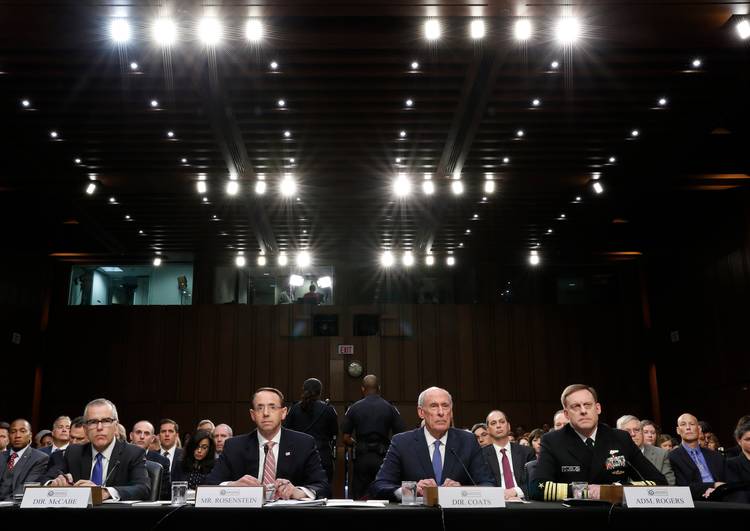
Andrew McCabe, Rod Rosenstein, Dan Coats and Director Adm. Michael Rogers. (Alex Brandon/AP)
ALL THE PRESIDENT'S MEN:
-- The FBI’s disciplinary office has recommended firing former deputy director Andrew McCabe, punting the decision to Jeff Sessions just days before McCabe’s expected retirement on Sunday — and possibly stripping McCabe of his full retirement benefits. Matt Zapotosky reports. “[The recommendation stems from] allegations that [McCabe] authorized the disclosure of sensitive information to a reporter and misled investigators when asked about it. The recommendation … is likely to add fuel to the political fire surrounding [McCabe], who abruptly stepped down from his post earlier this year but technically remained an FBI employee. … The call will ultimately be made by Sessions because of McCabe’s seniority ... "
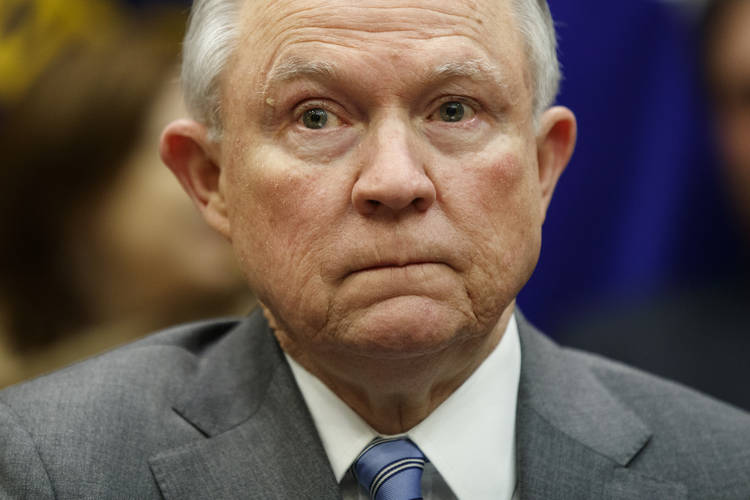
Attorney General Jeff Sessions listens during a meeting in the Roosevelt Room of the White House. (Evan Vucci/AP)
-- Trump is thinking about a wider personnel shake-up after ousting Rex Tillerson, per Vanity Fair’s Gabriel Sherman: “ ... three sources told me that the next official likely to go is National Security Adviser H.R. McMaster, who, like Tillerson, had advocated for remaining in the [Iran nuclear] deal. Last Tuesday, Trump met with ultra-hawkish former U.N. ambassador John Bolton in the Oval Office to discuss a potential job offer. …
“Perhaps most consequential for Robert Mueller’s investigation, sources said Trump has discussed a plan to fire [Sessions]. According to two Republicans in regular contact with the White House, there have been talks that Trump could replace Sessions with E.P.A. Administrator Scott Pruitt, who would not be recused from overseeing the Russia probe. Also, as an agency head and former state attorney general, Pruitt would presumably have a good shot at passing a Senate confirmation hearing.
“Then there is the question of Jared Kushner and Ivanka Trump’s futures. Trump has told people for months that he wants them to go back to New York. ‘Trump wants them out of there. He thinks they’ve been getting hit too hard,’ a friend of the president said. But Javanka are digging in, sources said. ‘They’ve damaged us so much already. What else can they say about us?’ Kushner recently said … ”
-- DOJ has appointed 17 “interim” U.S. attorneys that don't need Senate approval, Jeff Hauser writes for Slate. “On March 10, 2017, Sessions summarily fired 46 U.S. attorneys, including most dramatically U.S. Attorney for the Southern District of New York Preet Bharara. Under the Vacancies Act, the career figures who took over those offices could serve for 300 days on that acting basis. Flash forward the start of this year, when on Jan. 3, the [DOJ] announced the appointment of 17 interim U.S. attorneys to replace acting officials whose time had run out ... The 17 interim appointments were nearly exclusively from states with at least one Democratic senator." Historically, senators from the home state of a federal judge appointee have submitted a “blue slip” approving or disapproving of the pick.
 |
| Who is Larry Kudlow? |
-- Conservative commentator Larry Kudlow agreed to replace Gary Cohn as the head of the White House’s National Economic Council. The post doesn't require Senate confirmation. Robert Costa and Josh Dawsey report: “Kudlow, 70, had been seen inside the West Wing as the front-runner for days, but Trump formally offered Kudlow the job on Tuesday night … Kudlow is described by White House officials as someone who clicks with the president personally and politically, although Kudlow has been averse to Trump’s hard-line approach to trade policy. Trump now sees that kind of close rapport as central to his presidency … Kudlow was also an adviser to Trump during the 2016 campaign and worked closely with [Steven Mnuchin] on the design of an initial tax plan[.]”
“Conversations between Trump and Kudlow in recent weeks have focused on coming to an understanding on trade even as they expressed broad agreement about the economy …” “Larry has been a friend of mine for a long time,” Trump told reporters Tuesday. “He backed me very early in the campaign. I think the earliest, I think he was one of my original backers. He’s a very, very talented man, a good man.”
-- BUT: Post columnist Dana Milbank writes Kudlow “may have been more wrong about the economy than anyone alive” — recalling the comments he made before, and even during, the 2008 housing collapse:
- “Despite all the doom and gloom from the economic pessimistas, the resilient U.S. economy continues moving ahead,” Kudlow wrote in December 2007. “Kudlow, who previously derided as ‘bubbleheads’ those who warned about a housing bubble, now wrote that ‘very positive’ news in housing should ‘cushion’ falling home sales and prices. ‘There’s no recession coming. … It’s not going to happen,’ [he said].”
- “Kudlow’s tendency to err has been nearly flawless … But never has Kudlow been as spectacularly wrong as he was before the signal economic event of our time. Even as trouble became clear, Kudlow, a CNBC pundit who is not trained in economics, wrote a Feb. 5, 2008, column … saying he was ‘still betting on and buying Goldilocks [a just-right scenario] for the long run.’" “We are in a slow patch. That’s all,” he said. “It’s nothing to get up in arms about.”
-- Trump confirmed the news in a morning tweet:
 |
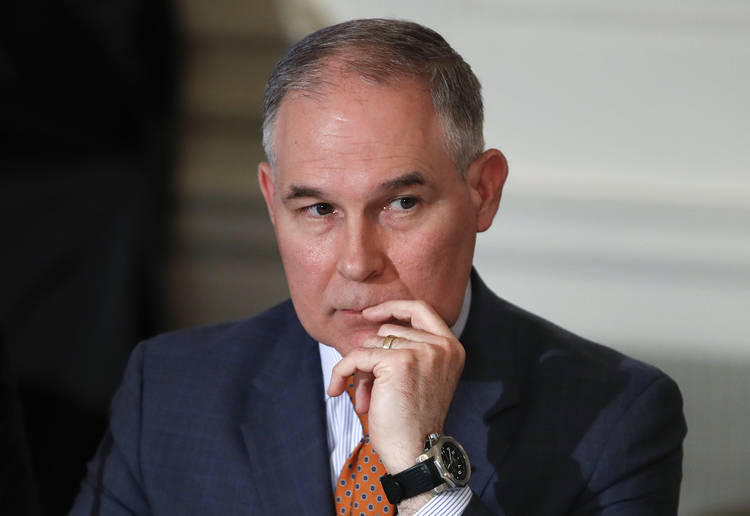
EPA Administrator Scott Pruitt attends a meeting with state and local officials about infrastructure. (Carolyn Kaster/AP)
-- “Trump finds himself presiding over a Cabinet in which a number of members stand accused of living large at taxpayer expense,” Juliet Eilperin and Brady Dennis write. “Last month, at least four Cabinet members — [HUD Secretary Ben Carson, EPA Administrator Scott Pruitt, VA Secretary David Shulkin and Interior Secretary Ryan Zinke] — met separately with White House Cabinet Secretary William McGinley to discuss proper ethics practices[.] … The meetings … included handouts with ethics advice and a discussion about how not to violate federal laws when traveling to campaign for political candidates. The tips included, ‘You are the best guardian of your reputation. Your record-keeping practices must be designed with a purpose to prove innocence at the complaint phase or with the press,’ and ‘Even if legal, does not mean you should do it — always consider optics.’”
- The latest example: Pruitt’s soundproof phone booth at the EPA actually cost $18,000 more than previously disclosed. The preparations to install the $25,000 booth cost $18,000 for a total cost to taxpayers of $43,000. (Brady Dennis and Juliet Eilperin)
-- Vicky Ward wrote a deep dive for HuffPost on Mike Pence’s chief of staff, Nick Ayers, and his many ties to dark-money groups: “Astonishingly, when Ayers entered the White House, he didn’t immediately sell his lucrative business, C5 Creative Consulting, as previous administrations would have required. He also obtained a broad waiver permitting him to talk to former clients. His ownership of C5 turned his White House job into a minefield of possible conflicts of interest. … But, as is clear to those who have followed Ayers’ rapid ascent to the top of his profession, he has made an art form of skillfully navigating the gray areas in electoral politics. And in the process, he has demonstrated that the real danger in our porous, post-Citizens United campaign-finance regime isn’t always what’s illegal, but what’s been made possible.”
-- Anthony Scaramucci has signed a book deal. But The Mooch said he does not intend to burn any bridges with Trump in the writing process. “It’s an entrepreneur writing about an entrepreneur who has now ascended into the presidency,” Scaramucci said, adding the book will focus on Trump’s management style. (New York Post)
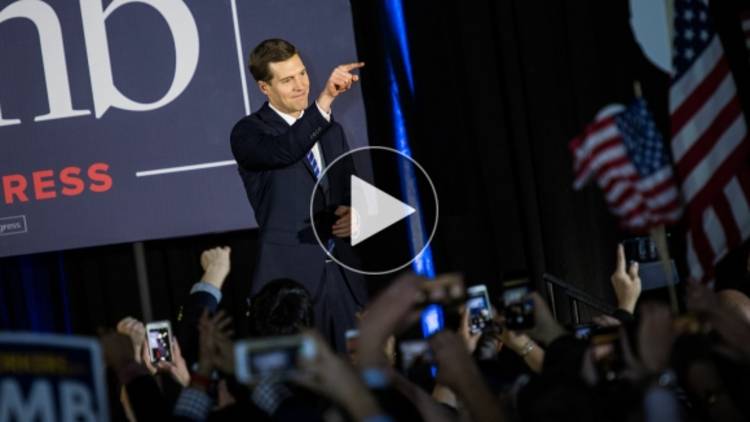 |
| Lamb declares victory; Saccone says, ‘It’s not over yet’ |
PENNSYLVANIA FALLOUT:
-- After Democrat Conor Lamb’s apparent victory in Pennsylvania, Republicans are bracing for a full-on blue wave in November. Michael Scherer and Sean Sullivan report: “Publicly, party leaders tried to cast the special election as a fluke, won by an idiosyncratic Democrat who ran to the right. But privately, strategists, donors and elected officials expressed alarm, with the November midterms looming. ‘Horrid’ was how one Republican in frequent contact with lawmakers described the political outlook. ‘Denial ain’t just a river in Egypt. This is a real problem,’ said Rep. Charlie Dent (R-Pa.), who has chosen to retire.”
-- “The special election in Pennsylvania isn’t the first data point to show Republicans that they’re in trouble, but if there was any complacency among elected officials, that’s certainly gone now,” Dan Balz writes. “Taking back the House is no slam dunk for the Democrats. They still lack a clear, positive and unifying message, just as they did in 2016. But in the nuts-and-bolts category, more than enough Republican seats are at risk for strategists on both sides to see a path toward a Democratic-controlled House starting in January.”
--Paul Kane writes that Trump has an Obama problem: “They both built unique coalitions that are proving difficult to replicate when they aren’t on the ballot ... Obama drew an outpouring of African American voters in 2008 and 2012, as well as a flood of young voters of all kinds who saw him as an inspirational figure. Trump in 2016 persuaded millions of voters, particularly across the Rust Belt, that they had been given a raw deal ...”
-- “Plan A apparently failed Republicans on Tuesday in Southwestern Pennsylvania,” the Philadelphia Inquirer’s Jonathan Tamari writes. “As they try to regroup from what looks like an embarrassing special-election loss, however, it’s not clear what they have for Plan B … Among those facing a difficult challenge is Rep. Ryan Costello, who represents a Chester County-based swing district that Trump lost and that moved left in the recent redistricting .... Costello has told GOP officials that he was uncertain if he would seek reelection, given the shifting map and brutal political environment[.] Costello is still circulating petitions to campaign but has not definitively said if he will run, leaving Republican leaders worried about having to scramble to find a replacement if he bows out.” Petitions are due Tuesday.
-- At his fundraiser last night, Trump claimed Lamb won because he’s “like Trump.” “The young man last night that ran, he said, ‘Oh, I’m like Trump. Second Amendment, everything. I love the tax cuts, everything.’ He ran on that basis,” Trump said. “He ran on a campaign that said very nice things about me. I said, ‘Is he a Republican? He sounds like a Republican to me.’” (The Atlantic)
-- Republicans are raising the fundraising alarms, with Senate Leadership PAC officials urging its donors to give directly to GOP candidates, reports Michelle Ye Hee Lee. “In our view, one of the most urgent takeaways from PA-18 special election is that a candidate who underperforms in fundraising will underperform on Election Day,” said Steven Law, the super PAC’s president and a former chief of staff to Senate Majority Leader Mitch McConnell (R-Ky.) ... “Outside groups can help make up the difference, but if the candidate doesn’t have the resources to make their own case to the voters, no outside groups can do that for them.”
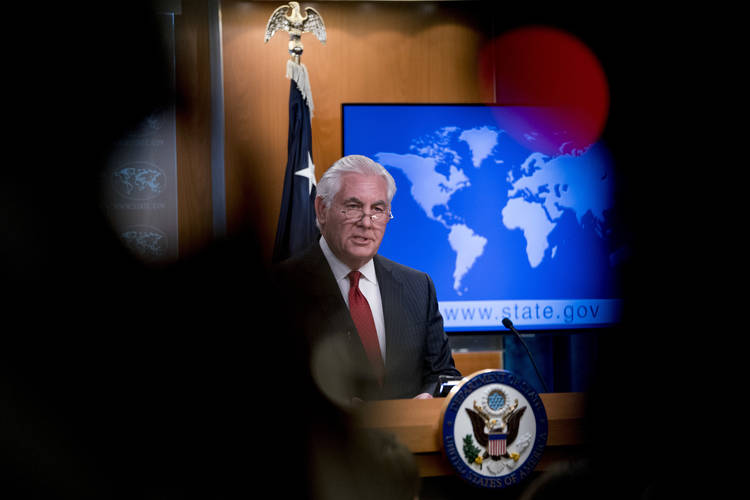
Secretary of State Rex Tillerson speaks at the State Department. (Andrew Harnik/AP)
REXIT FALLOUT:
-- Diplomats and civil servants in Foggy Bottom expressed both “relief and trepidation” following Tillerson's ouster. John Hudson reports: “For the hopeful, the transition rids the department of a former oil executive criticized for walling himself off from career diplomats, attempting to slash the department’s budget and returning internal memos from subordinates with grades reflecting typos and other highly technical infractions ... ‘[CIA Director and State nominee Mike] Pompeo isn’t a micromanager, and he didn’t start his tenure by saying we have to cut the agency by 25 percent,’ said [one official]. ‘That’s a good start.’
- As Trump announced Tillerson’s firing, one of the secretary's top aides was in Europe prepping to negotiate a possible addition to the Iran deal. “That side deal requires European governments to take a tougher stance toward Iran in exchange for a promise that Trump will not rip up the entire agreement, a promise Europeans are already viewing with more skepticism …”
- And the fate of Policy Planning Director Brian Hook is under “intense speculation,” given expectations that Pompeo would clean house if confirmed. “Hook built up a team of 15 staffers in his office who held significant sway over department policy across every geographic region,” Hudson notes.
-- Tillerson’s departure has jeopardized the nomination of the State Department’s top Asia official, who has been criticized as soft on China. Josh Rogin reports: “Foreign service officer Susan Thornton has been serving as the assistant secretary for East Asian and Pacific affairs for more than a year[.] … On Air Force One in November, on the way back from President Trump’s trip to Asia, Tillerson personally persuaded Trump to approve Thornton’s nomination. … But now that that Tillerson is out, Thornton’s detractors want Pompeo to pull her nomination and choose someone else.”
-- Sen. Rand Paul (R-Ky.) plans to oppose the nominations of Pompeo and Gina Haspel as CIA director, becoming the first Senate Republican to publicly break with Trump’s picks. Karoun Demirjian reports: “ ... Paul pointed to Pompeo’s hawkish stance on Iran, stating that he ‘cannot endorse [Trump’s] nomination of people who loved the Iraq War so much that they want an Iran War next.’ Pompeo and Haspel, he continued ‘want to manipulate the president into the sphere of the neocons who never met a war they didn’t want to star in.’” Paul added that he believed Haspel’s “record on torture … should disqualify her from consideration” as the next CIA chief.
Rep. Liz Cheney (R-Wyo.), Dick's daughter, criticized Paul's opposition:
 |
 |
| Is Dodd-Frank dead? Here's what you need to know |
THE REST OF TRUMP’S AGENDA:
-- A bipartisan majority of senators rolled back banking regulations passed in the wake of the 2008 financial crisis. Erica Werner and Renae Merle report: “Despite President Trump’s promise to do a ‘big number’ on the Dodd-Frank Act of 2010, the new measure leaves key aspects of the earlier law in place. Nonetheless, it amounts to a significant rollback of banking rules aimed at protecting taxpayers from another financial crisis and future bailouts.”
-- Tricky Democratic politics: " ... for the first time since Trump became president, the divisions lurking within the Senate Democratic Caucus burst into full view, with Sens. Elizabeth Warren (Mass.) and Sherrod Brown (Ohio) leading vehement opposition to the bill, even as supporters — including Democrats up for reelection in states Trump won — supported it with equal vigor.”
-- The White House quickly knocked down a proposal to provide short-term protections for “dreamers” in exchange for border wall funding. From Mike DeBonis and Josh Dawsey: “One idea under consideration is a three-year extension of the DACA program in exchange for three years of wall funding, a GOP official said. This official said the talks, which are being led by senior policy adviser Stephen Miller and legislative affairs head Marc Short, were fluid. White House spokesman Raj Shah said in a statement later Wednesday that the administration opposes a ‘three for three’ deal, which some moderate Republicans already have floated.”
-- Defense Secretary Jim Mattis called on Congress to maintain U.S. support for the Saudi-led bombing campaign in Yemen. From Karoun Demirjian: “Mattis wrote [in a letter to congressional leaders] that restricting military support the United States is providing to the Saudi-led coalition ‘could increase civilian casualties, jeopardize cooperation with our partners on counterterrorism, and reduce our influence with the Saudis — all of which would further exacerbate the situation and humanitarian crisis.’ … Sens. Bernie Sanders (I-Vt.), Mike Lee (R-Utah) and Chris Murphy (D-Conn.) are leading the Senate effort to invoke the War Powers Resolution and force a vote on ending the U.S. involvement in Yemen’s civil war — a vote that is now expected to take place next week … ”
-- Trump plans to “talk denuclearization” when he sits down Kim Jong Un, but that word can meaning different things to different leaders, Anne Gearan notes. “The unwieldy term is typically part of a stock phrase, ‘denuclearization of the Korean Peninsula,’ that U.S. officials have used for more than a decade to mean that North Korea would abandon its nuclear weapons. … For [Kim], denuclearization probably means, at most, some far-off possibility that he will downsize or get rid of his country’s nuclear arsenal[.] … To Kim, it may also mean assurances that the United States won’t replace the nuclear weapons it pulled out of South Korea more than 25 years ago. It could even mean the end of the large deployment of U.S. forces there.”
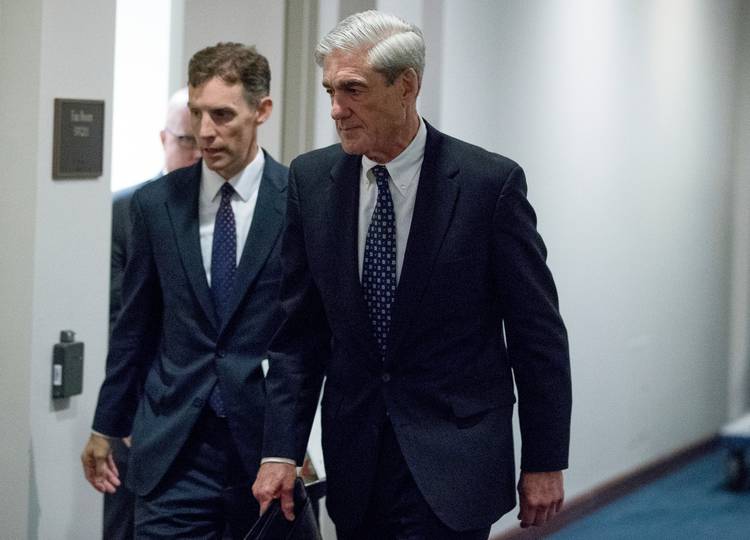
Robert Mueller departs Capitol Hill following a closed door meeting in Washington. (Andrew Harnik/AP)
THERE’S A BEAR IN THE WOODS:
-- Paul Manafort has added former federal prosecutor and tax fraud expert Richard Westling to his legal team, a move that comes as he faces charges in both D.C. and Virginia courts. Politico’s Darren Samuelsohn reports: “Westling’s online biography at the law firm [Epstein Becker Green] notes that he has nearly 30 years dealing with a range of white-collar defense issues. He worked for more than eight years at the Justice Department, including … as a trial attorney in the tax division’s criminal section.”
-- Manafort’s lawyers moved to dismiss some of the criminal charges brought against him by Mueller’s team. From the AP’s Eric Tucker and Chad Day: “In a series of motions, attorneys for [Manafort] attacked the case brought against him in Washington, arguing that [Mueller] exceeded his authority to prosecute Manafort on criminal charges that date back more than a decade. The arguments largely mimic a civil suit Manafort filed earlier this year.”
-- A federal judge rejected a request from Manafort’s former deputy Rick Gates, who asked to remove a GPS monitoring device after he pleaded guilty to charges filed by Mueller’s team. (Politico)
-- Publishers are closing guarding the manuscript of former FBI director Jim Comey’s forthcoming book. Politico’s Annie Karni reports: “Instead of circulating multiple print drafts among the editors and agents working on the book, the publisher, Flatiron Books, has implemented a password-protected electronic system so that only those involved in the project have access to it. The project is stored under a code name so that staffers who are not involved in the project wouldn’t know where to find it if they tried. At warehouses that will ship out copies of the book, workers are being asked to sign nondisclosure agreements … ”
-- John Dowd, Trump’s personal lawyer in the Russia investigation, contributed more money to Trump’s 2020 reelection campaign last year than is legally permissible, according to an FEC letter earlier this month. Under federal law, the maximum amount an individual may contribute to a political campaign is $2,700. But Dowd has given a total of $3,000, CNBC reports. The campaign said it has since issued a refund check to Dowd.
-- The House Intelligence Committee has set a deadline of next Thursday to make any changes to its draft report on its Russia investigation (written solely by Republicans). Once the panel’s members adopt the report as final, it will be sent to the intelligence community for redactions of classified information. (Karoun Demirjian)
-- The FEC is weighing whether to require disclaimers on political ads in mobile apps like Snapchat. Michelle Ye Hee Lee and Tony Romm report: “The proposal would apply narrowly to a small category of political commercials and likely would leave largely untouched the types of ads that were linked to Russian operatives in the 2016 campaign. The new requirement may not be in place to affect the 2018 midterm elections[.]”
 | |||||||||||||||||||||||||||||||||||
| Britain takes action against Russia for poisoning of double agent
-- British Prime Minister Theresa May said the U.K. will expel 23 Russian diplomats in retaliation for the attempted assassination of former spy Sergei Skripal and his daughter using a military-grade nerve agent. The expulsion is the largest to occur in decades and could ratchet up tensions between London and Moscow to levels not seen since the Cold War, Adam Taylor reports.
-- But: "[It] was not clear how strongly allies would rally to [May's] side, and experts said that behind Mrs. May’s tough talk lay relatively mild measures, the headline-grabbing expulsion aside,” the New York Time’s Richard Pérez-Peña and Stephen Castle report. “That, in turn, reflects Britain’s weakened position in the world, as well as Russia’s continuing success in sowing discord and division.”
STUDENTS PROTEST:
-- The protests over congressional inaction on gun control came to Capitol Hill’s backyard. Joe Heim, Marissa J. Lang and Susan Svrluga report: “Hundreds of high school and middle school students from local districts gathered at the White House carrying signs protesting gun violence and those who oppose gun-control measures. Just before 10 a.m., the crowd fell silent and sat down on Pennsylvania Avenue, their backs to the White House, with fists and signs held high. They sat quietly, one minute for each of the Stoneman Douglas victims. As the silence was broken at 10:17, the crowd began chanting, ‘We want change!’” The student-led protests were replicated nationwide.
-- Meanwhile, inside the Capitol, the House overwhelmingly passed a bill aimed at improving school safety that has nothing to do with guns. Ed O'Keefe and Amy Gardner report: “The bill reauthorizes a program created in 2001 ... to prevent threats against schools. The legislation authorizes $50 million to intensify school security, pay for federal ‘threat assessment teams’ to help school districts sort through reported threats, create an anonymous reporting system so that students and others can report threats and pay for training and technical assistance programs for law enforcement and school officials to help identify potentially violent behavior.” As for guns, nothing.
-- The Senate Judiciary Committee also held a hearing on the Parkland shooting. From Ed and Amy: “At the hearing, the FBI’s acting deputy director, David Bowdich, repeated the department’s assertion that warnings about accused shooter Nikolas Cruz were not sufficiently heeded. … [Senators] focused primarily on the failure of law enforcement to act on dozens of tips received about the Parkland shooter, as well as their systems for assessing threats and collecting data on those threats."
-- At the state level, Maryland’s House of Delegates advanced a bill banning bump stocks. Ovetta Wiggins reports: “The bill was one of three key measures aimed at addressing gun violence that advanced in the General Assembly. The others would help take weapons out of the hands of domestic violence offenders and people dealing with mental illness.”
-- Nikolas Cruz, charged with perpetrating the massacre, was arraigned yesterday. Mark Berman reports: “During the arraignment, some of the people gathered in the courtroom wore shirts and pins honoring the victims of the massacre. After the hearing ended and Cruz was led out, one of the people watching the hearing could be seen crying into a tissue and shaking her head.”
SOCIAL MEDIA SPEED READ:
Larry Kudlow's selection as NEC chief brought back some of his old tweets criticizing Trump. From 2015:
And, as recently as Saturday, Kudlow shared articles attacking Trump's trade policy:
Sen. Elizabeth Warren (D-Mass.) echoed Rand Paul's concerns about Trump's pick for CIA director:
A grim pool inside the White House:
From an editor for the Weekly Standard:
Real talk from this GOP strategist:
A Democratic lawyer skilled in recounts canceled travel plans to Pennsylvania:
Sen. Bob Corker (R-Tenn,), a past Trump critic, defended the president on Russia:
A Parkland survivor encouraged student activists who walked out of class yesterday:
A House Democrat joined the demonstrations:
Nancy Pelosi recognized a colleague's long record of public service:
Sen. John McCain (R-Ariz.) marked an important anniversary:
Sen. John Kennedy (R-La.) responded to the recent death of a dog on a United flight:
A Politico reporter commented on Mike Pence's fundraiser for his brother's congressional campaign:
Barack Obama released his March Madness brackets:
The former FBI director chimed in:
A Post reporter shared this joke from the late Stephen Hawking:
And rumors of Donald Trump Jr.'s divorce caused this 2006 New York Times article to recirculate:
GOOD READS FROM ELSEWHERE:
-- Arthur Brooks said he plans to step down as the president of the American Enterprise Institute and explains the reasoning behind his decision in a Wall Street Journal op-ed, “Reflections on a Decade of Leading a Think Tank:" “[What] worries me most today—not for AEI, but for America—is that the competition of ideas is under attack. Many would rather shut down debate than participate in it. …. [But] if we’re wrong, the best way to learn it is through challenges from our friends on the other side of the issue. Another threat to the world of ideas is arguably even more insidious: mediocrity through trivialization, largely from misuse of new media. To understand this, remember Gresham’s law: ‘Bad money drives out good.’ If one form of currency is inherently more valuable than another in circulation, the better one will be hoarded and thus disappear.
“Today, we see a kind of intellectual Gresham’s law. Famous academics spend big parts of their days trading insults on Twitter. Respected journalists who suppress their own biases in their formal reporting show no such restraint on social media … I remain optimistic that think tanks, universities, and the media will continue to play a central role in American democracy. But the challenges to decency and seriousness are real, and complacency can be catastrophic.”
-- Daily Beast, “Neo-Nazi Group Implodes Over Love Triangle Turned Trailer Brawl,” by Kelly Weill: “The Traditionalist Worker Party gained national attention after its involvement at the deadly Unite the Right rally in Charlottesville, Virginia, last August. Its leader, Matthew Heimbach was arrested Tuesday for allegedly assaulting his wife and his spokesman after Heimbach was caught cheating on his wife with the spokesman’s wife.”
DAYBOOK:
Trump will welcome Irish Prime Minister Leo Varadkar to the White House. The president will then attend the Friends of Ireland luncheon at the Capitol. He also has two meetings with members of the American Petroleum Institute and Bill Gates. Trump will close out his day by participating in the Shamrock Bowl presentation by Varadkar.
NEWS YOU CAN USE IF YOU LIVE IN D.C.:
-- Another windy day in Washington but with slightly higher temperatures. The Capital Weather Gang forecasts: “Skies should start out mainly clear. As temperatures rise, clouds pop up in profusion by midday and one or two may even produce a sprinkle or flurry (mainly in our colder areas). Highs in the low 50s are an improvement, but winds from the southwest gusting up to 30 mph are not.”
-- The Wizards beat the Celtics 125-124 in double overtime. (Candace Buckner)
-- Rep. Elijah Cummings (D-Md.) is recovering at home from a knee infection with an unknown return date to work. Jenna Portnoy reports: “Cummings was admitted to Johns Hopkins Hospital on Dec. 29 with a bacterial infection in his knee. Within a few weeks, he moved to an inpatient rehabilitation facility associated with Hopkins, and he is currently working from home.”
-- A group of D.C. council members is opposing D.C.'s expected contribution to Metro. Robert McCartney reports: “[D.C. Mayor Muriel] Bowser (D) and council member Jack Evans (D-Ward 2) want the city to commit to $178.5 million a year in new, permanent funding for the transit system, officials said Wednesday. That’s the total anticipated in the Virginia legislation[.] … But [six] council members sent Bowser a letter late Wednesday saying the city should give Metro only $167 million a year. The letter also says the District should contribute no more than Virginia and Maryland … ”
-- Bowser is expected to sign legislation to form a commission to examine D.C.’s high maternal mortality rate. Fenit Nirappil notes: “D.C. mothers are twice as likely to die because of pregnancy than the average American woman. … The city’s infant mortality rate is also troubling to policymakers. In Southeast D.C., babies die at more than twice the rate of the U.S. as a whole and nearly 10 times the rate of those in affluent Northwest Washington.”
VIDEOS OF THE DAY:
Late night hosts mocked Trump's vision of a "space force” fighting alongside the military:
A Democratic super PAC released an ad targeting Paul Ryan to be aired nationally and specifically in his Wisconsin district:
(Mike DeBonis has more on the ad, which comes as a response to scores of Republican attack ads against Nancy Pelosi.)
The father of a Parkland victim spoke about the path forward on gun control:
Rep. Steve Scalise (R-La.), who was critically injured in last year's Alexandria shooting, praised the House's passage of the school safety bill:
The Post fact-checked Trump's numbers on “sanctuary cities”:
And former Washington Redskins player Kirk Cousins touched down in Minnesota:
|



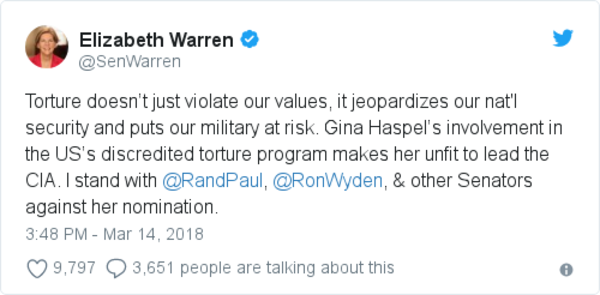



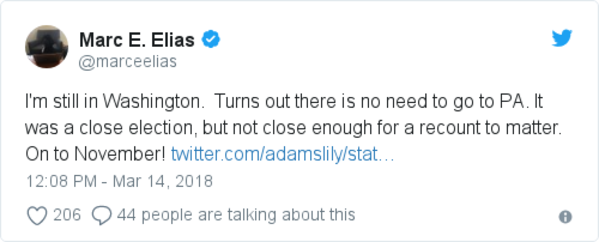













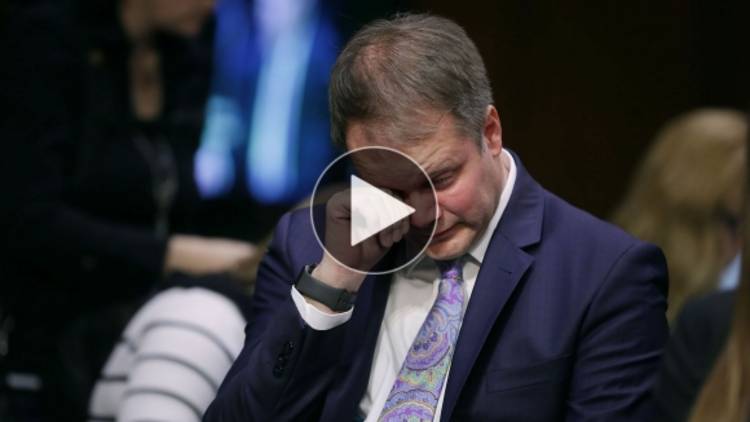



Comments
Post a Comment